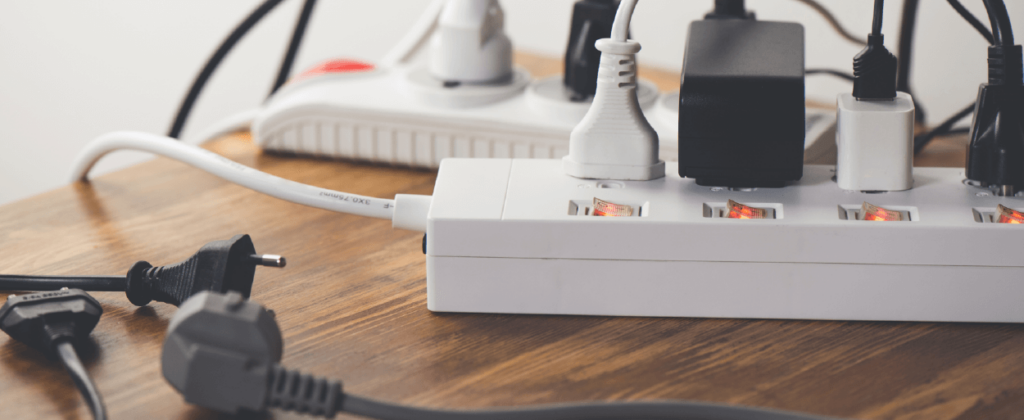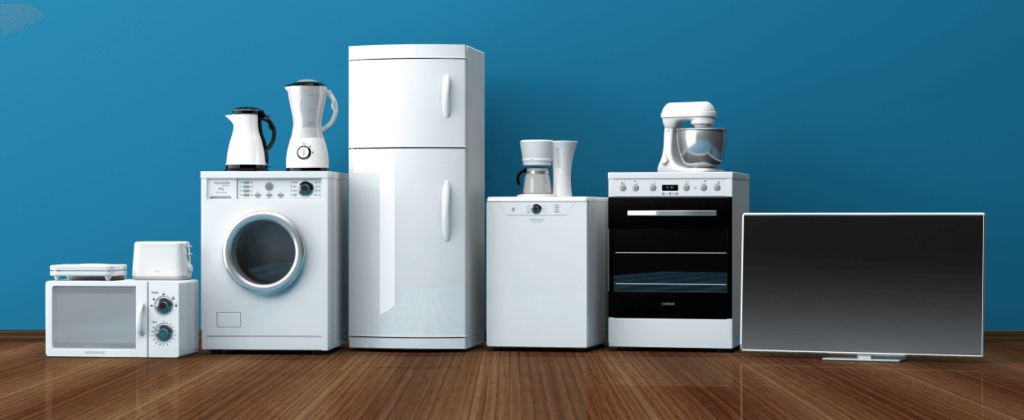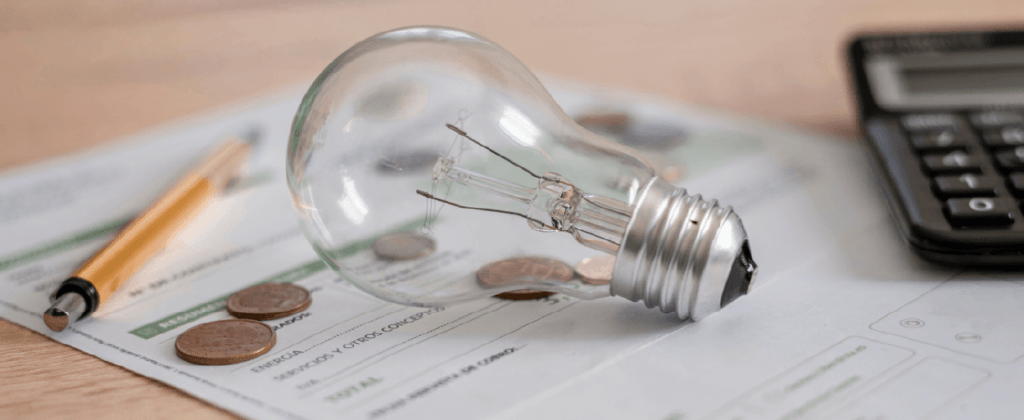
Have you seen or heard of the term, “vampire power”? Chances are you have encountered it in one form or another. Also known as phantom energy, leaking energy, ghost load, power leach, no-load power, and many other names, vampire power refers to the electricity wasted by gadgets and other household appliances.
Modern appliances often default to “standby mode” when not in use, but are still plugged in, which makes you believe they are not pulling any power. Many appliances, such as those with light-up displays, or those with automatic updates continue to draw power even in standby mode. However, devices with visible displays are not the only ones contributing. Let’s examine vampire power, explore ways to reduce it, identify which appliances consume the most energy, and discover how solar power presents a solution to lower your overall energy bill.

What is Vampire Power?
Vampire power refers to the electricity used by appliances that remain connected, although they appear to be off. Vampire power can also be from any household appliance employing automatic updates, voice commands, or timer activation.
While the convenience of having appliances or devices at our disposal is undeniable, it comes at a cost. While leaving a single device plugged in may appear to be harmless, the cumulative effect of multiple power-hungry appliances can result in a significant spike in your electric bill, costing you money.
How Vampire Power Works
When electronics or household appliances are connected to an outlet they use power. Items like device chargers, space heaters, and hair tools can continue to draw power from outlets when not in use but still remain connected.
Surveys reveal over 80% of Americans admit to leaving electrical appliances plugged in at all times, regardless of whether they are being used. Nearly 70% of those surveyed are unfamiliar with the term “vampire power”. The average household consumes 25% of their home electronic usage when appliances appear to be turned off. Unfortunately, this statistic will likely only rise as vampire power has become more common as technology has become more advanced.

What Appliances are the Biggest Vampires?
Discovering the culprits of energy vampires lurking in your home can be an eye-opening experience. Energy audits are a great way to lead you to the biggest vampires. From household items like TVs and computers, to gadgets like device chargers and kitchen appliances, the list of energy-sucking devices is extensive. Some of the most common include:
- Televisions
- Cable boxes
- Internet routers
- Stereo systems
- Printers
- Gaming consoles
- Desktop monitors
- Cellphone chargers
- Cameras
- Electric clocks
With more and more smart home devices and interconnected systems being installed, more household appliances are designed to remain in standby mode, ready to respond to voice commands or automatic updates, as needed. By educating yourself about vampire energy, you will understand the importance of energy-efficient practices and investing in management solutions. Therefore, your household can reduce unnecessary consumption and eliminate costs.
What Effects Will Vampire Power Have on My Household?
Energy vampires can have significant financial implications on your utility bills. Although it is entirely dependent on how many appliances or devices you have energized, the U.S. Department of Energy estimates vampire power accounts for around 10% of your electrical bill, on average, per household.
The type of device plays a role in determining potential savings from eliminating energy vampires. According to the Natural Resources Defense Council (NRDC), turning off your cable box could save you about $17.00, while switching off your television could save $14.00, and putting your laptop into sleep mode could save $7.50. These savings accumulate quickly, especially if you have multiple devices in your household.

Minimizing Vampire Power Throughout Your Home
Reducing vampire power may seem daunting, especially considering the impracticality of unplugging all household appliances when they are not in use. Major kitchen appliances like refrigerators are indispensable and require continuous power to operate. Additionally, other kitchen appliances such as microwaves and stoves may not warrant the inconvenience of daily unplugging, particularly for their digital clocks. To combat vampire energy and reduce your household’s energy bill, ask yourself these follow-up questions to determine the best course of action: What is your current energy bill, per month? Where are your greatest energy losses? Would you consider investing in more energy-efficient solutions?
Taking these practical steps can help you make informed decisions and achieve greater energy savings:
Step 1: Conduct periodic at-home energy audits to identify where your home is losing energy and where you should implement measures to save.
While professional energy assessments are available, conducting your own assessment can also be effective. This assessment entails a thorough walkthrough of your home, noting inspected areas and any problems encountered. According to the U.S. Department of Energy, execute your own home energy assessment by following:
- Locate air leaks, both inside and outside of your home.
- Consider ventilation paths to address backdrafts and indoor pollution from fuel-burning appliances.
- Verify your insulation levels are sufficient and meet the minimum requirement.
- Inspect your home’s heating and cooling equipment as recommended by the manufacturer.
- Evaluate the efficiency of your home’s lighting by checking the lightbulbs and considering more energy-efficient options, like LED’s.
- Consider different strategies for how to reduce energy usage. One such strategy could include purchasing a new, more efficient product that uses less idle energy.
Step 2: Unplug Devices After Use: Many handheld devices and appliances can continue to draw power while not in active use. Try implementing the habit of unplugging hair dryers, space heaters, and toasters when not being used. If this habit does not seem to stick, turn to timed power switches or smart power strips.
Step 3: Minimize Unnecessary Digital Displays: Appliances like microwaves, ovens, and coffee machines all have their own digital displays illuminating the time. Each time they light up (constantly, for some), power is used. Check to see if your appliance displays can be minimized or shut off altogether. You can typically find this information by searching your device’s model number or referencing the instruction manual.
Step 4: Disable Screensavers: Switch off “instant-on” or “quick start” options on gaming consoles and other personal devices, like laptops. By activating the “auto power down” mode on, you can maximize energy savings.
Step 5: Install and Utilize Smart Power Strips: Smart power strips are another easy to install and popular option to cut back on energy waste. Typically, you can control a smart power strip through an app on your phone. Having complete control of what receives energy in your home is invaluable and reduces energy vampires.
Step 6: Invest in Renewable Energy: Although a more long-term solution, another option to minimize your energy bill is to consider installing solar panels. Partner with Blue Raven Solar to have full control over your electrical bill and bask in the savings.
By following these steps and making informed decisions about your energy usage, you can significantly reduce vampire power in your home. You can potentially expect a noticeable decrease in your monthly energy bill, as well.

How Can Solar Help You Reduce Your Energy Bills?
The implementation of a solar panel system leads to savings in multiple areas, but primarily through your monthly power bill. By becoming more efficient in your daily habits, combating vampire power is often achievable without an extreme decrease in energy usage. Partnering with a reputable solar installer, such as Blue Raven Solar, can unlock advantages impacting both vampire power and your overall energy expenses.
Embracing solar power offers the advantage of enhanced energy independence. By harnessing the sun’s energy to power your home, you can reduce your reliance on the traditional utility grid system and commit to increased power prices. With a customized solar panel system, you can gain full visibility and control over your energy usage, ensuring every watt generated serves your needs. Because of production tracking apps, like the Enphase app, tracking your energy production in real time becomes effortless, empowering you to manage your household’s energy consumption with precision.
Stopping vampire energy in its tracks is achievable with the help of a high-quality solar installation.
Take Control by Partnering with a Solar Industry Leader
Blue Raven Solar’s goal is to offset your utility bills by guiding you through the solar panel installation process. We ensure the process, from start to finish, is a seamless journey through offering a high-quality, world-class customer service experience.
With offices and services available throughout the nation, partnering with Blue Raven Solar can help you harness the cost-effective benefits of renewable solar energy. Combined with the ability to track production and allocation, solar is a smart choice to save you money. Join the movement and see how we strive to provide each customer with a 5-star experience.
Get your free solar estimate today!



Sorry, the comment form is closed at this time.